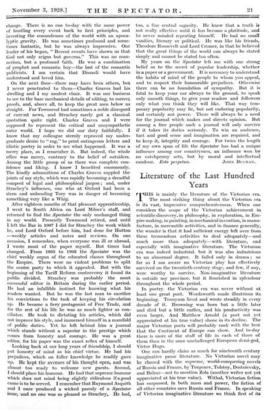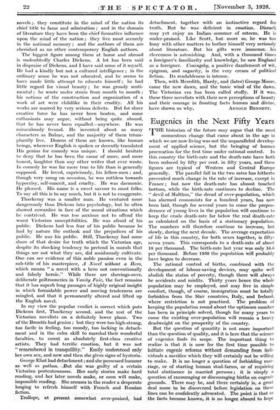Literature of the Last Hundred Years
THIS is mainly the literature of the Victorian era. The most striking thing about the Victorian era is its vast, impressive comprehensiveness. When one considers the scope of the Victorian achievement in scientific discovery, in philosophy, in exploration, in Em- pire making, in painting, in mechanical invention, in manu- facture, in mercantile activities, and in finance generally, the wonder is that it had sufficient energy left over from these tremendous activities to deal adequately—and much more than adequately—with literature, and especially with imaginative literature. The Victorian era was indeed industrial, but it was also industrious to an abnormal degree. It failed only in drama ; so far as I am aware no Victorian play has effectively survived on the twentieth-century stage, and few, if any, were worthy to survive. Non-imaginative literature is outside my province, but it flourished in splendour throughout the whole period.
In poetry. the Victorian era was never without at least one great poet. Wordsworth made illustrious its beginning. Tennyson lived and wrote steadily in every decade of it. Browning was born but a little later and died but a little earlier, and his productivity was even larger. And Matthew Arnold (a poet not yet appreciated at his true value) shone in its decline. The major Victorian poets will probably rank with the best that the Continent of Europe can show. And, to-day there is more of the stuff of life in each of three of them than in the once unchallenged European demi-god, Victor Hugo.
One can hardly claim as much for nineteenth century imaginative prose literature. No Victorian novel may be classed with the supreme, world-conquering novels of Russia and France, by Turgenev, Tolstoy, Dostoievsky, and Balzac—not to mention Zola (another writer not yet appreciated at his true value). Withal, Victorian fiction has surpassed. in both mass and power, the fiction of all other countries save Russia and France. In speaking of Victorian imaginative literature we think first of its novels ;. they constitute in the mind of the nation its chief title to fame and admiration ; and in the -domain of literature they have been the- chief-formative influence upon the mind of the nation ; they live most securely in the national memory ; and the authors of them -are cherished as no other contemporary English authors.
The biggest figure among them at home and abroad is undoubtedly Charles Dickens. A lot has been said in dispraise of Dickens. and I have said some of it myself. He had a kindly but not a cultured intelligence ; in the ordinary sense he was not educated, and he seems to have made little attempt to educate himself ; he had little regard for visual beauty ; he was grossly senti- mental ; he wrote under strain from month to month ; his notions of the construction and organization of a work of art were childlike in their crudity. All his works are marred by very serious defects. But for sheer creative force he has never been beaten, and some enthusiasts may argue, without being quite , absurd, that he has never been equalled—anywhere. He was miraculously fecund. He invented about as many characters as Balzac, and the majority of them trium- phantly live. Dozens of them are known, like human beings, wherever English is spoken or decently translated His genius for comedy was unique. I should hesitate to deny that he has been, the cause of more, and more honest, laughter than any other writer that ever wrote. In comedy he was far more true to life than is generally supposed. He loved, capriciously, his fellow-men : and, though very smug on occasion, he was ruthless towards hypocrisy, self-conceit, and cruelty. He was daemonic. He pleased. His name is a sweet savour to most folks. To say all this is to say much, but it is not to exaggerate. - Thackeray was a smaller man. He ventured more dangerously than Dickens into psychology, but he often showed cowardice in face of the moral situations which he contrived. He was too anxious not to offend the .worst Victorian susceptibilities. He was afraid of his public. Dickens had less fear of his public because he had by nature the outlook and the prejudices of his public. He was his public. Still, Thackeray had some share of that desire for truth which the Victorian age, despite its shocking tendency, to pretend in morals that things are not what they are, did assiduously cultivate. One can see evidence of this noble passion even in the sub-title of his masterpiece, A Novel without .a Hero, which means " a novel with a hero not conventionally and falsely heroic." While there are slurrings-over, deliberate poltrooneries in Vanity Fair, the fact remains that it has superb long passages of highly original insight in which formidable power and moving tenderness are mingled, and that it permanently altered and lifted up the English novel.
In my view the popular verdict is correct which puts Dickens first, Thackeray second, and the rest of the Victorian novelists on a definitely lower plane. Two of the Bront6s had genius ; but they were too high-strung, too facile in feeling, too moody, too lacking in detach- ment and in the calm skill to marshal their wonderful faculties, to count as absolutely first-class creative artists. They had terrific emotion, but it was not
" remembered in tranquillity." Emily understood only
her own sex, and now and then she gives signs of hysteria.
George Eliot had detachment ; and she possessed humour as well as pathos. But she was guilty of a certain Victorian portentousness. Her early stories make hard reading, and her later novels make, or soon will make, impossible reading. She amuses in the reader a desperate longing to refresh himself with French and Russian fiction.
Trollope, at present somewhat over-praised, had detachment, together with an instinctive regard for truth. But he . was, - deficient in.. emotion. Disraeli may yet enjoy an - Indian-summer of esteem. He is under-praised. Like Scott, but -more so, he was too busy with other matters to bother himSelf.very seriously about literature. But his gifts were immense.- his cleverness is. astonishing. And, with a thousand times a foreigner's familiarity and knowledge, he saw England as- a foreigner. Coningsby, a positive dazzlement of wit, epigram, and sagacity, is the very cream of political fiction. Its readableness -is intense.
Then, with Meredith, Hardy, and (later) George Moore, came the new dawn, and the tonic wind of the dawn. The Victorian era has been called stuffy. If it was, these three novelists with their new perceptions of beauty and their courage in fronting facts human and divine,



















































































































 Previous page
Previous page